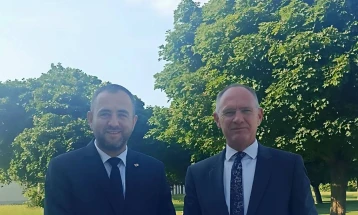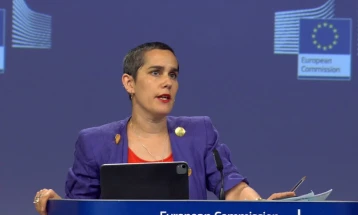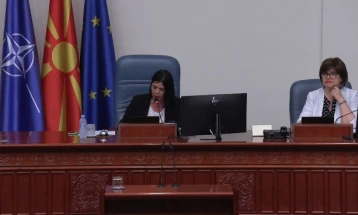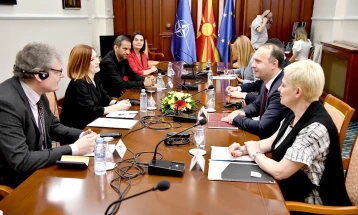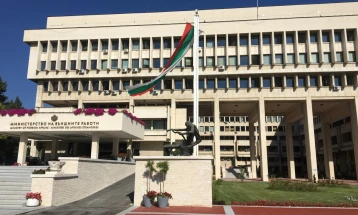Justice Ministry: Working group prepares draft amendments to Law on Judicial Council, based on EU peer review mission recommendations
- The Ministry of Justice informs that the working group has prepared draft amendments to the Law on Judicial Council, based on the recommendations of the EU peer review mission, particularly focusing on "individual disciplinary responsibility of Council members, defining the grounds for initiating proceedings, the body/entities responsible for proceedings, and the right to appeal."
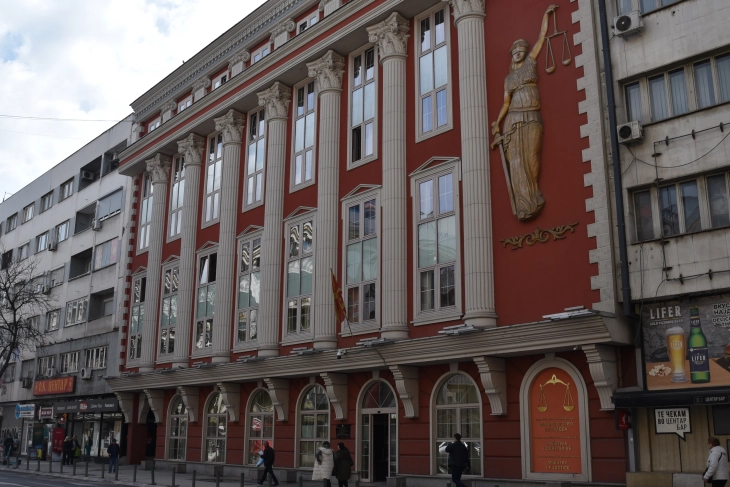
Skopje, 11 June 2024 (MIA) - The Ministry of Justice informs that the working group has prepared draft amendments to the Law on Judicial Council, based on the recommendations of the EU peer review mission, particularly focusing on "individual disciplinary responsibility of Council members, defining the grounds for initiating proceedings, the body/entities responsible for proceedings, and the right to appeal."
The Ministry of Justice has highlighted that in the current implementation of the Law on the Judicial Council of the Republic of North Macedonia, certain shortcomings have been identified. The EU peer review mission has provided concrete proposals for overcoming these issues. In response, the Minister of Justice formed a working group to draft amendments to the Law on the Judicial Council of North Macedonia in line with the recommendations from the EU peer review mission. This working group convened 23 meetings to address the relevant recommendations of the EU peer review mission.
"According to the Judicial Sector Development Strategy, there is a plan to revise the provisions of the Law on the Judicial Council of the Republic of North Macedonia concerning the individual disciplinary responsibility of Council members. This revision will particularly focus on defining the reasons for initiating proceedings, determining the responsible bodies/entities, and ensuring the right to appeal," as outlined in the Ministry of Justice's press release.
"The key updates proposed in the draft law for amending and supplementing the Law on the Judicial Council of the Republic of North Macedonia, based on the recommendations of the EU peer review mission, include:
1.The Parliament of the Republic of North Macedonia's call for the election of a Council member allows for the following entities to nominate candidates:
- The Interuniversity Conference, with candidates being regular law professors with a minimum of 20 years of professorial tenure from the country’s top three universities.
- The Bar Association of the Republic of North Macedonia, putting forward candidates who are practicing lawyers with at least 20 years of experience.
2. Extending the judicial tenure requirement from 6 to 15 years as a condition for members of the Judicial Council from the ranks of judges.
3. Increasing the work experience requirement from 15 to 20 years as a condition for members of the Judicial Council elected by the Parliament of the Republic of North Macedonia.
4. Regulating the method of selection of members of the Council by the Parliament of the Republic of North Macedonia, following comparative experience for the selection of members in the State Commission for Prevention of Corruption according to the Law on Prevention of Corruption and Conflict of Interest.
5. Introducing an electoral threshold for the selection of members to the Judicial Council from the judiciary, where elections are deemed successful if more than half of the registered voters in that electoral district participate.
6. Implementing a rule where, in order for a candidate to be elected as a member of the Council from the judiciary, they must receive more votes than half of the total voter turnout," as informed by the Ministry of Justice.
The EU peer review mission's report on the functioning of the Judicial Council contains 40 recommendations, grouped into six segments - the structure and competence of the Judicial Council itself, the mandate of its members, the process of selection and appointment of judges, disciplinary procedures, transparency and communication with the public, and resources and financing.
For 17 recommendations related to improving the practice and functioning of the council itself, which can be implemented without any legal changes, the Judicial Council has already made amendments to its rules of procedure as well as to the rulebook for ranking candidates for the election of judges in higher courts. Additionally, it has adopted a new communication strategy for greater transparency.
The remaining measures include constitutional or legislative changes and concern who can be elected as a member of the Judicial Council, the length of their term, the definition of "eminent jurist," establishing a framework for the method and procedure for dissolution the Council President's position, the responsibility of Council members, as well as providing reasoning for the procedure and decision-making for sanctioning judges.
The EU peer review mission consisted of three legal experts from Croatia, Belgium, and Italy, and visited the country in September 2023. During their stay, they analyzed the legal framework and met with all relevant institutions, as well as experts from the non-governmental sector.
Photo: Ministry of Justice

